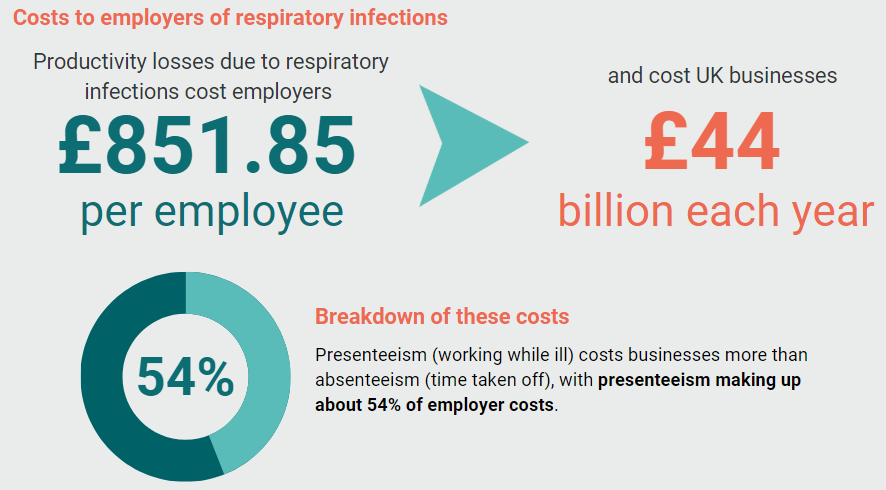Our latest research shows respiratory infections cost UK businesses £44 billion a year. Workplace vaccination programs and health-focused policies could help boost productivity, reduce costs, and address health inequities.
This consulting report ‘Employer Costs from Respiratory Infections’ was commissioned and funded by Pfizer.
Key takeaways
- Respiratory infections hit harder than you think: Short-term respiratory infections are an underestimated drain on employees, businesses, and the economy. In particular, presenteeism (working while ill) causes significant productivity losses.
- The impact is not uniform across people or industries: The burden of respiratory infections is disproportionately higher for women and varies across business sectors.
- Prevention pays off: Investments in prevention, including vaccines, hygiene, and social distancing, could yield big returns for businesses. With many working adults excluded from NHS-provided respiratory vaccines, employer-led vaccination programs could bridge the gap and drive productivity gains.
- Policy levers to encourage action: Policies like tax exemptions for workplace vaccination programs and support for occupational health services could amplify the impact and ease implementation.
Background
A healthy and productive workforce has long been recognised as a critical pillar of a strong and robust economy. The impact of poor health on business costs and productivity has been studied across multiple conditions and recognised as a key policy issue (Schultz and Edington, 2007; Department for Work and Pensions and Department of Health and Social Care, 2024b). In contrast to more chronic conditions, the direct impacts of respiratory infections (such as influenza, COVID-19 and RSV) tend to be self-limiting and shorter in nature, and therefore their impact is often overlooked and poorly measured. Due to their high prevalence – concentrated over winter months – respiratory infections have a considerable impact, both in terms of direct medical costs (around £86 million each year in the UK) but also to businesses and the economy at large (Meier et al., 2020). Respiratory infections account for one-third of all sick days in working populations (Wormer et al., 2017). Impacts on businesses go beyond employee absences: research has shown that productivity losses of people working while ill may be greater than the absence impact (Hemp, 2004; IPPR, 2024).
While several studies consider the impact of various respiratory infections on businesses, a number of gaps remain. First, most do not appropriately capture the emergence and ongoing impact of COVID-19. Second, most consider a specific type of respiratory infection rather than the aggregate impact of respiratory infections on businesses. Third, most focus on absenteeism only and therefore underestimate the costs that may be driven by on-the-job productivity losses (presenteeism). Fourth, existing estimates use wage as a proxy for productivity, which is often sub-optimal. Finally, there is a lack of UK-specific data and analyses that consider how impacts may differ by industry.
We report the results of a survey designed to address these gaps. Data were collected on 2,910 adults from a UK panel by YouGov plc between 11th and 24th October 2023.
Key findings

Respiratory infections pose a substantial burden on employees, businesses, and the economy. Employees, on average, are impacted by respiratory infections for over an entire working week throughout the year (5.2 days). 1.1 of these days are taken as absence. The remainder of those days are impacted as presenteeism days (4.1 days), during which productivity drops by 32%.

The cost to the employer, per employee, in terms of productivity loss due to absenteeism and presenteeism is estimated at £852 per year, contributing to an annual national economic cost of £44 billion in the UK. These costs may be exacerbated during high transmission periods, particularly in industries reliant on face-to-face interactions.
Costs are likely to vary significantly across industries, influenced by workplace factors such as availability of remote work, workforce demographics, and operational requirements. This report finds that women are disproportionally impacted by respiratory infection in terms of absenteeism and presenteeism compared to men.
Policy Implications
Preventative measures — including vaccination, hand washing, mask-wearing and social distancing — have the potential to deliver significant returns on investment (ROI) for employers. With most working-aged adults ineligible for NHS-provided respiratory vaccinations, workplace vaccination programs could reduce the burden imposed by respiratory infections on employers, as they have demonstrated effectiveness in mitigating absenteeism and presenteeism (Verelst et al., 2021; Hansen, Zimmerman and van de Mortel, 2018), and survey respondents reported high openness to uptake. Such programs could particularly benefit industries that are disproportionately affected by absenteeism and presenteeism caused by respiratory infections, and contribute to broader efforts to boost economic productivity.
This study also highlights disproportionately higher days impacted by respiratory infection for women compared to men. Workplace vaccination programmes may therefore offer a solution to not only improve overall workforce health, but as a potential tool to address health inequity within the workforce.
The high cumulative cost of respiratory infections to businesses indicates the critical role employers could play in mitigating their impact through health-focused workplace initiatives. Vaccination programs, supported by favourable policy frameworks, could represent a practical and impactful solution. Supportive government policies to incentivise employer-led vaccination programs could include tax exemptions and support for occupational health services. These initiatives align with national priorities to improve workforce health, reduce economic inactivity, and address health equity.
By prioritising workforce health, businesses can enhance productivity, retain talent, and contribute to the UK’s economic growth. Policymakers must recognise this link and act to support employer-driven health interventions.
This consulting report ‘Employer Costs from Respiratory Infections’ was commissioned and funded by Pfizer.
A cost calculator, also commissioned and funded by Pfizer, is now available for employers to estimate the potential financial impacts of employee absenteeism and presenteeism due to respiratory infections. You can try it now: https://www.ohe.org/respiratory-cost-calculator/





